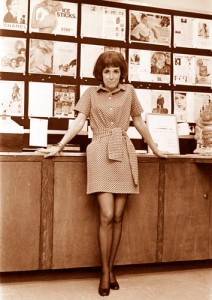As a feminist, Helen Gurley Brown, Cosmopolitan’s legendary editor, was, how you say, complicated. A trailblazer in many ways–especially in regards to sex and single girls–she was also a workaholic seemingly afflicted by low-self esteem, serious body dysmorphia and massive insecurities. Brown sold women’s sexuality with the gusto of Guccione, if not with the same visual explicitness. She was a wave ahead of the feminists of her day, but also in some senses a step back. She may have had it all, but some of it was questionable. From Judy Bachrach’s 1982 People article about Brown:
“Her eyes are so demurely downcast she can scarcely raise them to acknowledge a compliment. ‘My outfit?’ she whispers at a noontime visitor to her Manhattan office, nervously fingering the Adolfo black knit that swathes her body. ‘Well, I suppose it’s all right. I mean it should be because these patterned stockings are from Geoffrey Beene. But then’—fingers clutch at her throat—’I don’t know. I mean Estée Lauder says these gold chains are out of style.’ The face grows distraught. ‘Oh, here I go again, criticizing myself when I get praise. Now why do I do that?’
The editor of Cosmopolitan does that because at 60—after a poor childhood in Arkansas, 23 years of obscurity as a secretary and ad agency copywriter in Los Angeles, as well as bouts with dermabrasion, massive dieting, massive exercising and massive success as a writer and movie biggie’s wife—there is still a sizable part of Helen Gurley Brown that believes she is plain and slightly inadequate. That her taut, 5’4″, 105-pound body still isn’t quite right. That the nose she once had (‘She keeps a photo of it in her files,’ says an ex-Cosmo staffer) might just be the real her. That her no-college education is deficient. That she is not merely tiny but, to use a favorite term, a ‘mouseburger.’
No matter. Helen’s 66-year-old husband and chief booster, David Brown, who co-produced The Sting, The Sugarland Express and Jaws I and II, says, ‘I think she’s a classical beauty.’ The editor’s friend, gossip columnist Liz Smith, observes, ‘Helen is a fanatic. The perfection of her body is a form of religious fanaticism. She saw herself as very unattractive and felt she could rise above it.’ Pause. ‘And she did.’
Smith notes that Helen will dine out with pals but have only ‘a Perrier and a horrifying little fish.’ She’ll not only pinch pennies, but has been known to take the untouched wine from a festive lunch table—and the balloons too. Why? Because like Cosmo’s two million readers and the fans of her first smash book, Sex and the Single Girl, and her current autobiographical/inspirational hit, Having it All, Brown knows she didn’t go from poverty to high priestess of passion simply through mouseburgering. She did it, she admits, through shrewd use of self-deprecation and lowered lids, through affairs both good and rotten that have involved married office colleagues (never rule out anyone, she writes, even the boss: ‘Why discriminate against him?”). But above all, she succeeded through devoted toil.
‘One of the things that binds Helen and David is their discipline for work,’ says Dick Zanuck, David’s partner in Zanuck/Brown Co. ‘They don’t have a lot outside their careers. She does not play canasta or lunch with the girls. He does not go fishing.’
Their sports are taking care of each other. Helen has been known to snatch the bread out of David’s mouth in restaurants to keep him at his trim 160 pounds. ‘I have been a terrific wife,’ she likes to say. Each morning, at their triplex on Manhattan’s Central Park West, she weighs David, then fixes his breakfast (bran muffins, juice, scrambled eggs or fish cakes or cereal). When he dares to make his own, she grouches, ‘You don’t like me today.’ She never lets him fret about her. Once, when she was scheduled in advance for a series of operations, she didn’t tell David until ‘the night before I went into the hospital.’ Why should he worry about her for three weeks?'”

